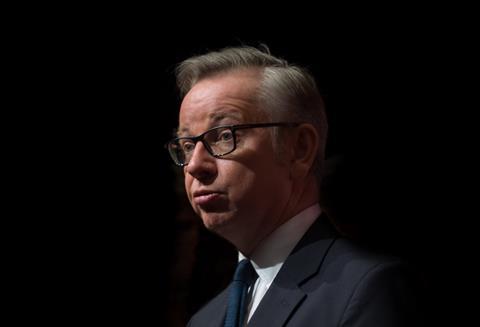Housing secretary says aiming for one target risks “making an enemy of the common good”
Housing secretary Michael Gove has said the government is not bound by its 300,000-homes-a-year target alone, in the clearest indication yet the Conservative Party’s manifesto pledge has been dropped.

Gove said: “It’s no kind of success simply to hit a target if the homes that are built are shoddy, in the wrong place, don’t have the infrastructure required, and are not contributing to beautiful communities.”
He said the government is “not bound by one criterion alone” on development, adding that while arithmetic is important, “so is beauty and belonging to a democracy”. He said aiming for one target “risks making someone’s perfect arithmetic the enemy of the common good”.
Gove was speaking on BBC Radio 4’sTodayprogramme yesterday, ahead of the publication of the Levelling Up and Regeneration Bill, which contains the government’s long-awaited planning reforms.
The Conservative Party’s 2019 general-election manifesto pledged to “continue progress towards our target of 300,000 homes year by the mid-2020s”. According to ONS figures, 216,000 homes were delivered in 2020-21.
Gove said he believed the planning reforms will see more homes delivered, however a briefing document published on Tuesday did not mention this, saying the purpose of the planning changes was to “give communities a louder voice, making sure developments are beautiful, green and accompanied by new infrastructure and affordable housing”.
>> Also readQueen’s Speech 2022: architects question feasibility of ‘street votes’ policy
The bill (see details below) will include plans to give residents a say on development, by allowing them to vote on local design codes through ”street votes”.
该法案还将用一项新的、不可协商的地方税收来取代106节,以提供住房和基础设施。它载有旨在简化地方规划的措施,并在规划系统中采用一种新的环境评估方法。
At a glance: Levelling Up and Regeneration Bill
- Lay the foundations” for all of England to have the opportunity to benefit from a devolution deal by 2030;
- Introduce a new approach to environmental assessment in the planning system;
- Replace Section 106 with a new locally set, non-negotiable levy to deliver housing and infrastructure;
- Simplify and standardise the process for local plans so that they are “produced more quickly and are easier for communities to influence”;
- Place a duty on the government to set Levelling Up missions and produce an annual report updating the country on delivery of these missions;
- Create a new model of combined authority: the ‘County Deal’ which will provide local leaders with powers to enhance local accountability, join up services and provide transparent decision making to rejuvenate their communities, increase their ability to reflect local preferences in arrangements including directly elected leaders’ titles;
- 赋予地方政府新的权力,让空置的房屋重新投入使用,并鼓励对市中心和大街上空置的商业地产进行租赁拍卖;and
- Give residents more of a say over changing street names.
- strengthen neighbourhood planning and digitise the system to make local plans easier to find, understand and engage with; by making it easier for local authorities to get local plans in place, we will limit speculative development. Territorial extent and application.
















1Readers' comment